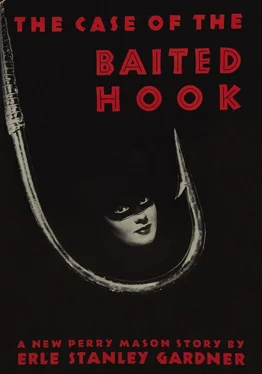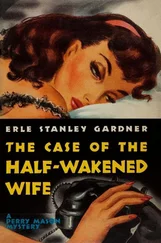“What,” Mattern asked, “can I do for you?”
“Not much for me,” Mason said. “It’s really for you.”
“What do you mean?”
Mason said, “I’m not going to mention names, Mattern, but the claim has been made that you left the broker’s office right after the completion of that stock deal and went out to report to Tidings, and while you were talking with him, there was a quarrel, that Tidings accused you of having a personal interest in the transaction and confronted you with proof, and that you shot him.”
“That’s absurd,” Mattern said.
Mason nodded affably. “Thought I’d mention it to you,” he said, “so you’d have a chance to clear it up.”
“In the first place,” Mattern said, “I can account for every minute of my time from the time I left that brokerage office.”
“That’s fine,” Mason said. “Would you mind running over the schedule with me?”
Mattern took a notebook from his pocket. “Not at all,” he said. “When I realized that it was going to be necessary for me to remember what had happened that day, I thought I’d better jot it down on paper.”
“Good idea,” Mason said.
“To begin with,” Mattern said, “I left the brokerage office at eleven-eight. I made a point to notice the time when the deal was closed. I returned to my office, and Mr. Tidings called me just about noon. I told him that the deal had been concluded satisfactorily. Mrs. Tump had been trying to see him, and I told him about that. Then I rang up a friend of mine in one of the other offices and asked her to have lunch with me. We went down in the elevator at five minutes past twelve, and I returned with her at five minutes before one o’clock.”
“I presume she can verify not only the occasion but the time,” Mason said.
“Certainly. She works in an office where they go by the clock. Her lunch hour is from twelve to one. She has to be back at her desk promptly at one o’clock.”
“I see,” Mason said, “and after that?”
“After that,” Mattern said, “I went back to Mr. Tidings’ office. There were some matters to take up with the manager of the building, and I rang up the manager’s secretary and asked for an appointment as near one-thirty as was convenient.”
“You got one?”
“Yes, at one-twenty-five. I talked with the manager of the building for fifteen minutes. I had told his secretary that my business would not take longer than that, and I remember looking at my watch and commenting to her as I went out that it had been fifteen minutes on the dot.”
“And then?” Mason asked.
“Then,” Mattern said, “I went down to a jewelry store to see about buying a new wrist watch. A chap whom I know works there, and I looked at wrist watches for nearly half an hour.”
“He’ll remember the occasion?”
“Oh, yes.”
“And the time?”
“He certainly will,” Mattern said, laughing, “because we were discussing the accuracy of watches. I bet him that my own wrist watch wouldn’t vary more than one second in half an hour from his standard chronometer. I was there half an hour, and we checked the second hand.”
“That brings you up to two-thirty,” Mason said.
“That’s right.”
“What did you do after two-thirty, Mattern?”
“I had some matters to go over with the accountant who makes out Mr. Tidings’ income tax reports. I asked him to meet me at the office at quarter of three. We were there until five.”
“And after five?” Mason inquired.
“I invited a young lady to meet me at five-twenty, to go to dinner and a movie.”
“The same young lady whom you took to lunch?”
“No, another one.”
“Why five-twenty in particular?” Mason asked.
“Well,” Mattern said, “it was… well, it just happened to be the time that I mentioned, that’s all.”
“Wasn’t that rather early for a dinner date?”
“Yes, perhaps. But I wanted to get in to the show in time for the first picture.”
“This young woman works?”
“No, she doesn’t.”
Mason said, “Well, let’s go back to Tuesday morning.”
“I came to the office at nine o’clock,” Mattern said. “Mr. Tidings came in about nine-fifteen. We handled some correspondence until ten-thirty, then we discussed details in connection with the closing of the Western Prospecting deal, and you called up. That started Tidings sputtering about what a busybody Mrs. Tump was, and we discussed that for several minutes. Then Tidings went out, and I went over to close that Western Prospecting deal.”
“See anyone except Tidings on Tuesday morning?” Mason asked.
“The brokers. Then there was Mrs. Tump shortly after eleven.”
“I mean before that.”
Mattern thought for a moment, then slowly shook his head. “No,” he said. “I don’t think anyone came to the office.”
“Immediately after noon,” Mason said, “your time seems to have been pretty well checked.”
“Yes, sir. There’s not more than twenty minutes at any one time, and it would have been a physical impossibility for anyone to get out to that bungalow where the body was found and back to the center of town within a twenty-minute period.”
Mason said, “That’s rather significant, don’t you think, Carl?”
“What do you mean?” Mattern asked in surprise.
Mason said, “You haven’t any alibi until around eleven o’clock on Tuesday morning. From then on, you have a perfect alibi covering every minute of the day, and the interesting thing is that in virtually every instance you made certain that the time would impress itself upon your witnesses.”
“What do you mean?”
Mason stared at him steadily. “I mean, Carl,” he said, “that you were trying to give yourself an alibi, that you were taking every precaution to see that every minute of your time was accounted for… Take for instance your comments with the secretary of the building manager on the length of time your conference had taken… The discussion about time at the jewelry store… The appointment with the tax accountant, and last of all that five-twenty dinner date.”
“Why, I… I don’t know what you’re talking about, Mr. Mason.”
“Oh, yes, you do,” Mason said gently. “You must have known he was dead before you went over to the broker’s, Carl.”
For a long moment, there was tense silence in the apartment. A cheap alarm clock ticked audibly on the dresser. Mattern’s eyes, wide and protruding behind the dark-rimmed spectacles, showed consternation.
Mason said, “I don’t think you killed him, Carl, but I do know that you were interested in that stock transaction. You knew that he was dead before it was time to go over to the broker’s office, and you knew that you had to make it appear Tidings was alive at the time that agreement was concluded.
“You were shrewd enough to realize that if you did make it appear he was alive at noon on Tuesday, the authorities would be forced to fix the time of death as almost immediately after noon, and so you were careful to build up an alibi which would protect you during the afternoon.”
Mattern said, “Mr. Mason, I can assure that I did nothing of the sort. I…”
“Don’t get yourself in bad,” Mason said.
“What do you mean?”
“Simply this,” Mason observed, crossing his legs, settling comfortably back against the chair, and lighting a cigarette. “I’m a mean fighter, Carl.”
“So I’ve heard.”
“In a fight,” Mason said, “I try to damage my adversary in every way possible. I hit below the belt.”
Mattern nodded.
“I’m representing a person,” Mason said, “who is going to be accused of the murder of Albert Tidings.”
Читать дальше












